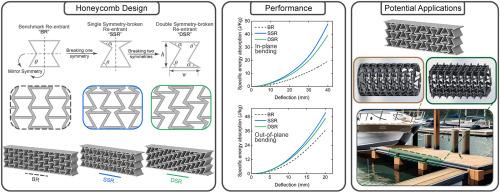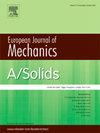Flexural behaviors of asymmetric Re-entrant auxetic honeycombs
IF 4.4
2区 工程技术
Q1 MECHANICS
引用次数: 0
Abstract
A family of negative Poisson's ratio honeycombs with asymmetric base units and potential applications in civil and marine industries are introduced by introducing asymmetricities to the geometry of regular re-entrant unit cell. These structures, namely the single symmetry-broken re-entrant (SSR), double symmetry-broken re-entrant (DSR), and hybrid symmetry-broken re-entrant (HSR) honeycomb lattices, are fabricated through fused filament fabrication and subjected to experimental three-point bending (TPB) experiments and simulations. The novel designs showcase exceptional specific energy absorption (SEA) attributes compared to the regular metamaterial, with the SSR structure exhibiting a remarkable 147.2% higher SEA. The asymmetric metamaterials also demonstrate higher flexural modulus (Ef) compared to the benchmark design, with the SSR and DSR models boasting approximately 29% and 19% higher Ef, respectively. Studies on design parameters show that internal angle of unit cells that creates the asymmetricity affects the flexural performance of the unique auxetic honeycombs, significantly. Finally, parametric investigation on out-of-plane bending of the honeycombs showed the dominance of all asymmetric-unit honeycombs over the benchmark due to having organized self-contact regions. The SSR and DSR structures own about 51% and 39% higher SEA than the benchmark honeycomb under out-of-plane TPB, respectively.

非对称 Re-entrant 辅助蜂窝的挠曲行为
通过对规则再入角单元的几何形状引入不对称,介绍了一系列具有不对称基底单元的负泊松比蜂窝结构,以及在民用和海洋工业中的潜在应用。这些结构,即单对称-断裂-再入角晶胞(SSR)、双对称-断裂-再入角晶胞(DSR)和混合对称-断裂-再入角晶胞(HSR)蜂窝晶格,是通过熔融长丝制造工艺制成的,并进行了三点弯曲(TPB)实验和模拟实验。与普通超材料相比,新颖的设计显示出卓越的比能量吸收(SEA)特性,其中 SSR 结构的 SEA 显著提高了 147.2%。与基准设计相比,非对称超材料还表现出更高的弯曲模量(Ef),其中 SSR 和 DSR 模型的 Ef 分别高出约 29% 和 19%。对设计参数的研究表明,产生不对称的单元格内角对独特的辅助蜂窝材料的弯曲性能影响很大。最后,对蜂窝平面外弯曲的参数研究表明,由于具有有组织的自接触区域,所有非对称单元蜂窝都优于基准蜂窝。在平面外 TPB 条件下,SSR 和 DSR 结构的 SEA 分别比基准蜂窝高出约 51% 和 39%。
本文章由计算机程序翻译,如有差异,请以英文原文为准。
求助全文
约1分钟内获得全文
求助全文
来源期刊
CiteScore
7.00
自引率
7.30%
发文量
275
审稿时长
48 days
期刊介绍:
The European Journal of Mechanics endash; A/Solids continues to publish articles in English in all areas of Solid Mechanics from the physical and mathematical basis to materials engineering, technological applications and methods of modern computational mechanics, both pure and applied research.

 求助内容:
求助内容: 应助结果提醒方式:
应助结果提醒方式:


